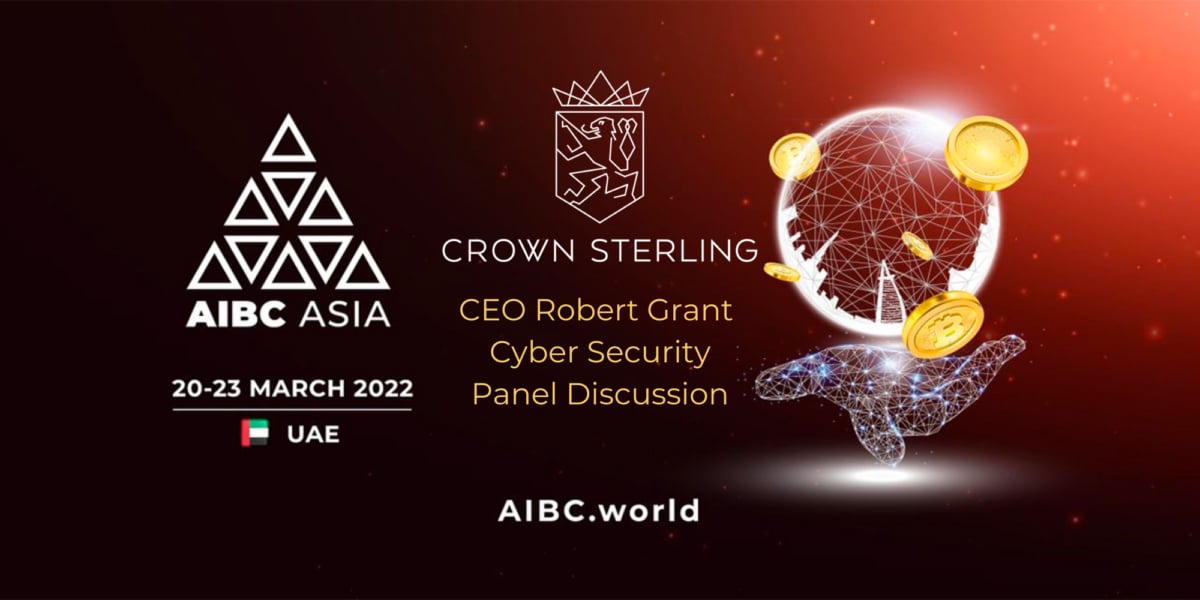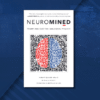
In late March, Crown Sterling attended the AIBC Asia Conference in Dubai, UAE. Among the outstanding guests, keynotes, and interviews of the Summit, Crown Sterling Founder and CEO Robert Grant participated in the panel ‘Cyber Security Update: Protect Your Websites & Applications From Hackers.’ Cyber security is an increasingly popular topic with new headlines circulating such as MIT Technology Review’s from April 15, 2022 article, “A $620 Million Hack? Just Another Day in Crypto“.
Fellow panelists included Dr. Jason Gamage, CISO at Goldilock and Simas Simanauskas, Director of Partnership at ConnectPay. The discussion was moderated by Dustin Plantholt, Founder & CEO at Crypterns, a fast-growing ‘crypternship’ platform with a mission to fulfill the high demand for internships and careers in the blockchain ecosystem.
In partnership with Crypterns, Crown Sterling will host the first Blockchain Summit in Egypt with over 40 Key Opinion Leaders from the blockchain industry. The objective of the summit is to create synergetic connections and solutions that will shape the future of the industry.
Continue reading for the recap, or view the panel here:
Cyber Security Panel Recap
The conversation began with Dustin’s reference to the recent string of breaches experienced by major companies populating the headlines. “We need a new type of cryptographic protocol, and that is what we focus on at Crown Sterling,” stated Grant.
Many people at the consumer level assume blockchain is synonymous with encryption. “When you get to the consumer side of it, people don’t understand it yet,” Grant continued, “Right now, as an entire industry, we’ve gotten used to believing that the standards’ bodies can keep up fast enough with the pace of innovation of that one hacker, that only needs to be successful once… NIST just spent the last 5 years working on an approach that remedy the “quantum problem” with quantum computers.”
Meanwhile, there have been many advances in the industry. IBM, for example, will launch a +1,000 qubit quantum chip, IBM Quantum Condor, targeted for the end of 2023. Thus, presenting to the world [again] that quantum computing is not three, five or ten years away. Quantum computing is at our door, which threatens most of the current cryptographic protocols available on blockchain networks.
Grant addressed this question with an explanation of symmetric, asymmetric keys, and the blockchain’s state transition function, explaining that the asymmetric encryption is where the real quantum risk is due to a quantum computer or hacker identifying the two factors or the elliptic curve factorization.
“Quantum computers are supposed to be able to crack encryptions in something called polynomial time, which is many many times faster than exponential time. But, if there is a geometric solution, that’s constant time. That is what was shown in Ars Technica this week. I’ve written about it, and this is very real.”
Just a week before the panel, an article in Ars Technica entitled, “Researcher uses 379-year-old algorithm to crack crypto keys found in the wild,” describes using a geometric approach to crack RSA encryptions in the wild.
In the past, Grant has shared, “Quantum computers are widely believed to be able to crack current encryptions using Shor’s algorithm. Recently, a Chinese research team reported the successful completion of a complex computation at a speed that was 10^23 times faster than today’s supercomputers. The encryptions that secure today’s bank transactions are designed so they should take 10^15 power years to break.”
Robert shared, “The White House announced recently that every branch must be on quantum-resistant encryption within six months. That decision says a lot; this [vulnerability from quantum-computing advancement] is a real issue.
There is a solution – and it is geometric. A prime number prediction pattern discovered and published by Grant and colleague Talal Ghannam PhD in 2018/2019, led Grant to look deeper into the risk of quantum computing, as well as the geometric approaches to face it head on. This paper was just the beginning of Grant’s work exploring mathematically-based solutions to information-theory related challenges like cryptography and compression. His most recent paper “A Novel Geometric Model of Natural Spirals Base on Right Triangle Polygonal Modular Formations,” sets a foundation for a new perspective of elliptic curve analysis and its relation to polygonal modularity.
“That there is a quantum-resistant solution: One-Time Pad encryption, which is viewed by cryptography experts as the most reliable method of data security. It is the world’s standard, and will be available to the world through our platform in a key compression that is outstanding and practical.”
About Crown Sterling Limited LLC
Leader in Data Sovereignty and provider of quantum-secure encryption, Crown Sterling empowers individuals and communities in an era of unregulated data consolidation, monopolization, and monetization by Big Tech. By leveraging next-generation encryption, blockchain technology, and decentralized digital transformation represented by Web3, we are committed to granting you complete control over your personal data and supporting the protection of free speech, assembly and choice.
The launch of Orion™ Messenger presents a quantum-secure end-to-end encrypted, uncensorable, and decentralized communications platform as a solution where sovereign individuals and communities can thrive. Unlike commonly used applications that rely on vulnerable encryption protocols, data mining practices, and other limitations, Orion is the only platform allowing for large encrypted group chat and social media communications in an unmonitored and uncensorable environment. Join the Orion Messenger waitlist.













